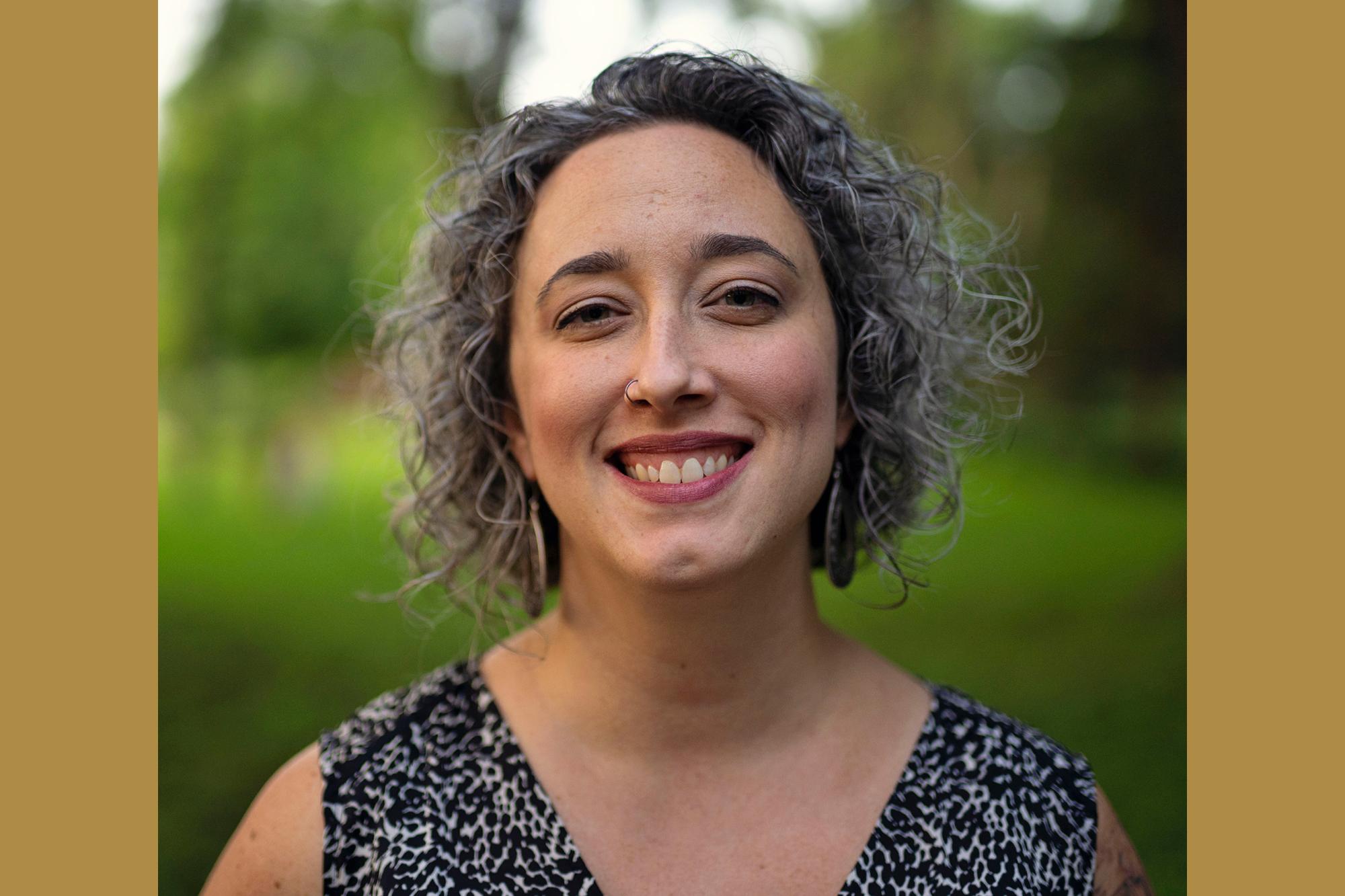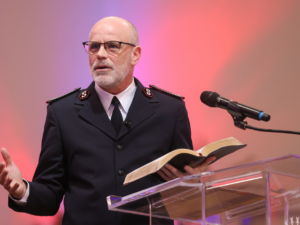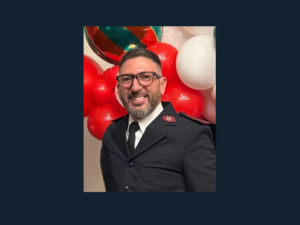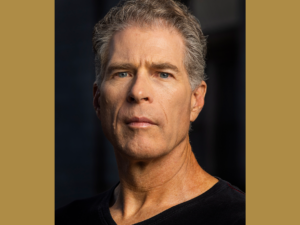No matter how dark the season is, “By God’s abounding grace, Christmas still arrives every year—somehow or other, it comes just the same…to direct our hearts and minds to the story of Christ and his people—and to place our lives and communities within this sacred narrative.”
These are the words of Dr. Emily Hunter McGowin from her new book, “Christmas: The Season of Life and Light.”
Dr. McGowin is associate professor of theology at Wheaton College, and co-pastors with her husband in the Anglican church.
Her new book is part of a series from InterVarsity Press about important dates in the Christian calendar. And I’d say she got the fun assignment: Christmas. Or rather, Christmastide—the 12 days of celebration from Christmas to Epiphany.
It’s a reflection on the moods, themes, rituals, prayers and Scriptures that mark Christmastide. A resource to help us live fully into both the theology and spiritual practices of the season—one of deep magic.
Because, as she writes, “At the center of the mystery of Christmas is the astonishing fact that God has come to dwell with us.”
Some might question the commercialism of Christmas, and yes discernment is key, but as Dr. McGowin would say, God is in the celebration, too. She writes, “God’s loving embrace extends to our particulars—noses and toes, meals and gifts, decorations and gift-giving.”
The season of life and light. Of timeless beauty.
Show highlights include:
- Insight into who Dr. Emily Hunter McGowin is and what she is passionate about.
- Her specialty in the study of lived religion and what it offers theology.
- More on her new book, “Christmas: The Season of Life and Light.”
- Her experience of Christmas as a kid.
- The “deep magic” of Christmas, and what’s at the center of the mystery.
- The focus of Christmas.
- More on the season of Christmas, or Christmastide, and what it includes.
- What these holy days meant to do.
- How gifts became such a central practice just about anywhere Christmas is celebrated.
- What her book reveals.
- One way for Christians to better or more deeply observe the holy days of Christmas this year.
Listen and subscribe to the Do Gooders Podcast now. Below is a transcript of the episode, edited for readability. For more information on the people and ideas in the episode, see the links at the bottom of this post.
* * *
Christin Thieme: Well, Dr. McGowin, thank you so much for joining me today on the Do Gooders Podcast.
Dr. McGowin: Thank you. It’s my pleasure to be here.
Christin Thieme: Yes, it’s an exciting time of year, especially around here at The Salvation Army, so merry, almost, Christmas coming up once again.
Dr. McGowin: Indeed.
Christin Thieme: And that’s going to be a big focus of today’s episode. But before we really dig into that, can you give us a little insight into who you are, and what you are passionate about?
Dr. McGowin: Yeah, so I am a theologian, and theology teacher. I also write, and pastor, I teach at Wheaton College in Wheaton, Illinois. And pastor a little church here in town with my husband, Ronnie, who’s also a pastor.
A lot of my writing is at the intersection of real life, like the messiness of Christian living, and theology, and so, it made sense to write about something as complicated as Christmas.
Christin Thieme: Yeah.
Dr. McGowin: We have three kids, who are 14, 13, and 10. They keep our life busy, and fun.
Christin Thieme: Yes, sounds like it, between all those different roles, you’ve got to be on your toes. So I just want to ask you about that interesting sweet spot that you’re in there. And I’ve seen it on your website that you study lived religion and what it offers theology. And you mentioned that a little bit. What does exactly that mean, or look like?
Dr. McGowin: Yeah, so I think, a lot of times, when we think theology, we think about the content of our heads, what our mind thinks. We think about the realm of ideas, and one of my assumptions is that theology is lived. It’s actually lived, experienced. And so, theology is actually reflection upon our encounter with the gospel, our experience walking with Jesus, our life lived in the Spirit, lived with the community of disciples.
I think we see this historically, even our bedrock doctrines of the faith emerge out of the life of the community. It’s not like it was just theologians in ivory towers who decided we’re going to call God Triune. No, it was through the worshiping life of the community that they realized, “Oh, God is this way.”
And so, I want to take seriously as a theologian the way that Christians live out their faith, sometimes in grace-filled ways, and sometimes, of course, in ways that are lacking that. But either way, I believe that God is always present, and at work in the world, and that means that lives, particularly for me, lives lived in community are sites where theology is happening, and I wanted to be able to take account of that.
Christin Thieme: I love that. And you, now, have a new book titled, “Christmas: The Season of Life and Light,” which is a perfect example of that lived religion, and what it offers theology, really. It’s actually part of a series about important dates in the Christian calendar. Can you share a little bit more about the book, and the series that it fits into?
Dr. McGowin: Yeah, so the series from IVP is called The Fullness of Time, and it’s meant to provide brief but hopefully still deep introductions to what liturgical traditions called the Church Calendar.
So the seasons of the Church year, starting with Advent, and then, Epiphany, Lent, Easter, Pentecost, and then, oh, I skipped Christmas. I skipped my own book. Advent, Christmas, Epiphany.
But nevertheless, the idea is to introduce people for whom this is not a normal for them, say observing Lent, for instance, may not be a normal experience for them. So it introduces you to the major theological themes, the Scriptures, the prayers, and practices of the Church surrounding this season.
So my book is focusing on Christmas within that series, and it’s taking not just the day of Christmas, but the whole traditional Christmastide, 12 days, that are part of the Christmas season.
Christin Thieme: Which I think is something that a lot of us don’t necessarily know, or remember that it is part of this bigger series of days.
Dr. McGowin: Yeah.
Christin Thieme: You write in the intro that you grew up an ocean away from Bethlehem, but knowing still little about Christmas, and even still considered it your favorite holiday, can you tell us a little bit about your experience of Christmas as a kid?
Dr. McGowin: Yeah, so my mom loved Christmas, and we always went all out on decorations. We weren’t a religious family, but it was a very special time of year.
And I was a very imaginative child. I was a very introspective kid. I was always inventing stories about the world, and play-acting at things. And so, there was just something about the decorations, and the sights, and the sounds, and the smells of Christmas that really appealed to me.
And I think just even the straight-up mythology of Santa Claus, it caught my imagination. So yeah, I just enjoyed, it was like a break from the mundane for a little while, where you could pretend like miracles do happen.
And I was in a very secular home, so it was an unusual space to occupy for us. And I think that part of my interest in spiritual things probably stems from how much we enjoyed Christmas, and I kept hearing the story of the birth of Jesus, even though I didn’t have any personal interaction with that story yet.
Christin Thieme: Yeah, it’s an interesting sweet spot there, because you’d be hard-pressed to find someone who doesn’t know what Christmas is, right?
Dr. McGowin: Right.
Christin Thieme: But you might not really understand the backstory, or know about that. But then, there’s still, like you said, this mystery, you call it a “deep magic” in the book. What is it about that do you think? Why is there so much of a mystery and magic around Christmas?
Dr. McGowin: So, because I’m a theologian, I want to say, it’s because God really did become flesh. And so, even for folks like me, who were in secular environments, I think there’s still this echo, this gesture toward the reality that I believe in today, that the divine, actually, tabernacled among us, and somehow the creator of all things became one with creation, and condescended to live with us, and be a tiny baby.
It’s the craziest story you’ve ever heard, and yet, I also believe it’s true.
And so, I don’t know, I feel maybe I’m just overly optimistic, but I feel like even in a very secular culture, we’re still attracted to the notion of attaining something spiritual, something beyond what we can just touch with our hands, or taste, or smell, but something that’s divine.
And so, I think underneath those kinds of religious observances, whether it’s Christmas, or anything else, is a desire to get in touch with God, ultimately.
Christin Thieme: Yeah. So you write in the introduction, you paint this picture of the spot where Jesus was born, and then, juxtapose it with what is largely our experience of Christmas today. And if it’s okay with you, I just want to read these few sentences right from the intro.
Dr. McGowin: Sure.
Christin Thieme: You write, “For most of us, this season is hopelessly intertwined with sentimentality, nostalgia, and commercialism. Christmas overflows with vivid memories, some good, and some not so good, and elevated expectations, some healthy, and some not so healthy. Like Dr. Seuss’s Grinch perched on Mount Crumpet, our respective imaginations have loaded the Christmas sleigh with the surplus of sights, smells, sounds, tastes, soft candlelight, aromatic wassail, singing choirs, decadent pies, and puddings, the crinkle of shiny wrapping paper, and much more.”
And I think so many of us can relate to all of those things. That brings all kinds of feelings. So a question that you propose right after that, how do we know, and a question I’m proposing back to you, how do we know where those things end, and the real traditional, transcultural season begins? What do we do?
Dr. McGowin: Right, well, so it’s funny, when I was sitting down to try to write this book, I asked the question in writing, because that was the question I myself was asking. And the conclusion I came to, which I try to work out through the book, is I don’t know that we can totally disentangle those things, and I’m just not sure it’s possible.
I know that we have, in our mind, notions of purity, that if we could just peel away some of the layers, or get rid of this, or that, or the other, we could get down to the pure Christmas. And I just don’t think that that’s possible.
And that’s not to say that there’s no discernment to be exercised on what we do, or don’t do, observe, or don’t observe. But I just think we have to assume from the start that God is present and at work even in the midst of the crinkling wrapping paper, and the Wassail, the singing, and the commercialism.
And so, it’s better, I think, to take account of the traditions that have been handed on to us, and see, “Okay, is this something that has truth within it, or that points toward, or gestures toward truth, that we can more knowledgeably, wisely claim, and own? And then, where are the things that really are just even anti kingdom, not Christian, add-ons that we should set aside, and maybe turn away from?”
And that’s what I’m trying to do in the book, is give folks hope about the possibility that even in the midst of traditions you have mixed feelings about, God is still present there and you can still discern the Spirit’s work there, and experience the fruitfulness that God wants for us, even there.
Christin Thieme: I love how you phrase it, that “God’s loving embrace extends to our particulars—noses and toes, meals and gifts, decorations and gift-giving.” That he would celebrate too. Why not celebrate? It’s part of the magic.
Dr. McGowin: Right.
Christin Thieme: I love that. With that all in mind, what is the focus of Christmas?
Dr. McGowin: Well, of course, it’s Jesus. Yeah. It’s the birth of Christ, that God, in God’s providence, and goodness, and mercy, came to dwell amongst us, and initiated what I call this great exchange that God puts on flesh, and lives as a human among us, so that we might be joined to God, and become to participate in God’s own life.
And so, that I think is first and foremost, at the core, at the center, and then, everything flows from that. We could certainly talk about, well, if God became flesh and joined with creation, then that means that creation is good, fallen yes, but ultimately good, and that requires our reverence, and honor.
We can certainly talk about the parts of Christmas, and the Christmas story that include suffering, and trials, and tribulations, and that God is still present, bringing life and light even in those spaces.
But all of that I think is an extension of the central reality, which is that the Word became flesh.
Christin Thieme: Yeah. Why is it important to recognize, remember—you talked a little bit about that there’s Advent, and there’s that season of darkness, but no matter what, Christmas still arrives, that light still comes. Why is that an important reminder for us, year, after year?
Dr. McGowin: So I think a couple of things. One is it’s just so easy, particularly right now, to feel so cynical. There’s so much bad news all the time, and particularly, if you’re very online, which I’m less, and less so as the days go by, but if you’re very online, it’s just coming at you all the time, how dark the world is.
And so, I think, a lot of us feel quite comfortable in seasons like Advent, or Lent, because we’re thinking about how dark it is, and how hard it is, and certainly, that’s important. We don’t want to skip past that, or pretend it’s not there.
But Christmas reminds us that even when we are in the darkness, even when we’re not even looking for the light, God comes, and invades the darkness. God, at his own appointed time, sent his son. And so, it’s a reminder, one, that the light does indeed come, but also, two, that it’s God who does his good work.
Yes, we have work to do. We’re all about doing good, yes. But the initiative was God’s, and so, the power, the life, the endurance, comes from God, and I think, Christmas gives us an opportunity to remember that this wasn’t our idea. As much as we might like to think that we are, we’re great, and in control, ultimately, the incarnation was God’s initiative, God’s great gift to us, and this is a time to stop, and remember that.
Christin Thieme: Yeah. So you mentioned that Christmas, according to the Church calendar, is not just one day. Can you give us a little bit of insight into what is Christmastide? What does it include?
Dr. McGowin: Yeah. So Christmas, “The Twelve Days of Christmas” song, is not just a cute song. It’s actually referring to the traditional season, which would’ve stretched from sundown on Christmas Eve, so we, now, observe it as December 25th, through Epiphany, which is in the Western Church, at least observed on January 6th. So those 12 days in between Christmas and Epiphany are called Christmastide.
That was, usually, it comes to be either two Sundays, or one Sunday devoted to the observance of the Christmas season.
Now, that goes way back, that goes way to the seventh century in the church’s story, but when the Protestant reformation happened, and Protestants, and Catholics ceased to worship together, and then, there was all sorts of controversy, that I talked some about in the book, about the observance of the Christmas season. The 12 days fell out of fashion.
They were often used as an excuse by some people to cause a ruckus in the community, to drink a lot, and feast, and not work, so it became associated with things that Christians don’t want to be associated with.
And so, it wasn’t observed as often, but I’m finding more, and more, today, as people are rediscovering the Church calendar that they have more of an interest of, oh, so Christmas is 12 days, traditionally, how might we observe those days in an intentional way?
Christin Thieme: How do you experience Christmas with your family? Do you have any traditions around Christmastide?
Dr. McGowin: Yeah, this is great. I was talking to another friend of mine, who also feels passionately about intentionally observing the 12 days of Christmas, and we were both sharing about how hard it is, actually, to do in practice.
Because culturally, socially, everybody around us, the pinnacle is the 25th, so that, actually, feels like the high point, and then, it’s all downhill.
But if you’re trying to think about the 12 days as a whole, that should be the starting point, not the end point, but you’ve got the whole culture working against you.
Christin Thieme: Yeah.
Dr. McGowin: So it’s tough.
Christin Thieme: That’s a train you cannot stop.
Dr. McGowin: I’ll just tell you. Right, so I remember when my son was three, and we were trying to be good, observant Anglicans, and observe the 12 days of Christmas.
And so, we explained to him, “Christmas isn’t just one day, it continues for 12 days, and we’re going to celebrate each day.” And he was pumped, man. He was like, “Yes, 12 days of Christmas.”
Christin Thieme: “I’m in.”
Dr. McGowin: Yeah, right? And so, when I put him to bed on the night of the 25th, he said to me, “So mom, we get to open presents again, tomorrow, right?”
And I was like, “Oh, no. Well, I’ve made a huge mistake.”
Christin Thieme: And it’s only day one.
Dr. McGowin: It’s only day one. So I tell that story to tell you, this is still very much a work in progress for me, and even for my family.
We try to do a couple of things. So when we decorate for Christmas, it’s usually only a week, or two before Christmas. We go back, we don’t do the day after Thanksgiving. We try to delay it, so that we can enjoy it up until epiphany, so we get out our decorations later in the season.
We also have a big bin of Christmas books, that the kids have collected over the years, that only comes out during that season.
We have a bin of Christmas movies, and music that only comes out during that season.
And so, we know that this is the time to really enjoy these things that we don’t get to enjoy the rest of the year.
And then, we have special things. We’ll cook, or bake, and try to have something that’s celebratory, even if it’s not a whole pile of presents, each of those days leading up epiphany.
Christin Thieme: Yeah, I love it. You talk a little bit too, about your first experience of Christmas after you got married, and what that was like, and did you, actually, get woken up at 4:30 a.m. to open presents?
Dr. McGowin: That’s a true story. We were woken by my mother-in-law.
Christin Thieme: I should specify. Not a kid.
Dr. McGowin: Yeah. I have a vivid memory of being on an air mattress in her guest room, and waking up to her knocking. I recall opening my eyes, and I could see her feet under the door, and I was like, “What is happening right now?” And it was her, saying like, “Get up, Santa came, it’s time to open presents.” And I looked at my phone, and I was like, “It is 4:30 in the morning, what’s going on?”
Christin Thieme: That’s amazing.
Dr. McGowin: And my husband was like, “Sorry, this is just what she does.”
I’m like, “You could’ve warned me.”
Christin Thieme: He’s like, “Yeah, this is normal.”
Dr. McGowin: Yeah, that’s a true story.
Christin Thieme: I love that. So not everyone might wake up at 4:30 a.m., but pretty much everybody gives gifts for Christmas. How did gifts become such a central practice, just about anywhere Christmas is celebrated, and is it, Christ was given to us as a gift, so obviously, there’s a tie in there, but how did it become such a norm, I guess?
Dr. McGowin: So I think it really became the norm it is today, really in the mid 19th century, into the 20th century. Certainly, gift giving was a thing around that time of year, going all the way back to the Roman period, but as far as a straight-up commercial practice, where there’s this pressure to give gifts to people, now, it’s even to coworkers.
Christin Thieme: Everyone you know, and have ever met.
Dr. McGowin: Yeah. Now, I think that that comes with the rise of technology, really. So we have mass media, so we’re able to access magazines, and mail-order magazines, and then, eventually radio and television. So with the rise of the technology, and you’ve got retailers eager to sell their wares, it makes sense that advertisers would start to really seize on this holiday that has been associated with giving things, it’s going to sound bad, but to exploit it.
Christin Thieme: Yeah.
Dr. McGowin: But in the book, I say that it can be redeemed. I don’t think we have to just see it as an exploitative thing, although I agree we should exercise a sermon about how we spend our money.
Because the other background to gift giving at Christmas, goes back to St. Stephen’s Day, which follows Christmas within the Christmastide 12 days. And St. Stephen’s Day was traditionally devoted to giving to the poor. That was the time when they would collect food and firewood or actual money, and provide it to those in the parish that had needs.
And so, that giving away of things to those who were less fortunate, and didn’t have access to basic needs, was also part of the tradition. And again, in the 19th century, and 20th century, it turned into more inwardly focused, giving gifts to our loved ones, our family. I think that happened as we became more disconnected from each other, more dependent on the individual household.
But there’s the tradition there that we can reclaim if we want to.
Christin Thieme: Yeah, absolutely. And The Salvation Army is a big part of that.
Dr. McGowin: Yes.
Christin Thieme: And in your book description, the book is considered a meditation on what the Scriptures, practices, and prayers of the season reveal about God. So in your words, if you had to boil it all down, what does your book reveal?
Dr. McGowin: I’ve never been asked this question before.
Christin Thieme: I know it’s hard. You wrote a whole book—there’s more than one thing. But if you had to highlight one thing?
Dr. McGowin: I think it may, actually, come down to what you quoted from, I think it was from the introduction, about how the God revealed to us in Jesus Christ, is a God of particulars, that God has come amongst us, and therefore cares about everyone and everything, and that God’s redemption through Christ by the Spirit is for everyone, and everything.
And that extends, it includes our bodies, our minds, our souls, but it also includes our communities, it includes the creation, it includes institutions, it includes society.
And so, I think it’s about God’s love for creation, and desire to see it redeemed.
Christin Thieme: Yeah, absolutely. Lastly, given your experience, your expertise, your ministry, your writing, if you had to suggest just one way for anybody listening to better, or more deeply observe the Holy Days of Christmas this year, what would it be?
Dr. McGowin: Well, this year, I believe Christmas falls on Sunday. Is that correct? Let me check my calendar real fast.
Christin Thieme: Let’s see. I can’t remember.
Dr. McGowin: Think on the fly here.
Christin Thieme: Monday.
Dr. McGowin: Monday, okay, here it is. Go to church on Monday. I know that sounds wild, and there will be churches that don’t hold services, but when Christmas Day falls on a Monday like that, and even on Sundays too, most people spend the day at home, which I understand. A lot of times we’re doing so much, and we’re entertaining so many people, we’re exhausted, and we can’t even imagine dragging our gaggle of children, or even, just as a solo person, dragging ourselves into church.
But I really think that if Christmas is about God coming amongst us, one of the things that we can do to attend to God’s presence, is to go where God’s people are. And there’s something about singing the carols, and the songs, even if the keyboards not in tune, or the person next to you is off-key, and there’s a toddler running up and down the aisle.
Christin Thieme: The candlewick is dripping…
Dr. McGowin: Right. It’s precisely in these places where God is present in our world. And one of the very practical ways we can do that, is to show up for church. Yeah, I know that sounds super basic, but sometimes we got to keep it basic.
Christin Thieme: Yeah, exactly. It’s a great starting point. Well, thank you so much for sharing today. This has been a lot of fun, and I loved your book, and it’s definitely one to pull out year, after year, and kind remember what all is going on here as we get into the season. So thank you for the work that you’ve done on that.
Dr. McGowin: Yeah, it’s my honor. Thank you for reading.
Additional resources:
- Read “Christmas: The Season of Life and Light” (IVP Formatio, 2023) by Dr. Emily Hunter McGowin.
- Start your day with goodness. Get on the list for Good Words from the Good Word and get a boost of inspiration in 1 minute a day with a daily affirmation from Scripture sent straight to your inbox. A pep-talk for the day. A boost of inspiration and comfort. A bit of encouragement when you need it. Get on the list and start receiving what you need today.
Listen and subscribe to the Do Gooders Podcast now.












